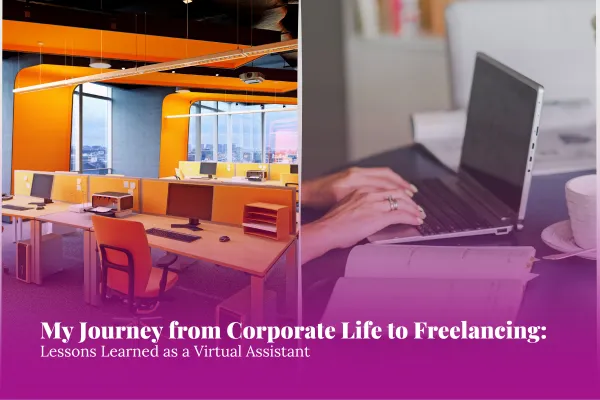
My Journey from Corporate Life to Freelancing: Lessons Learned as a Virtual Assistant
In 2022, I made a life-changing decision to switch my career from a customer service representative to a virtual assistant (VA). This wasn’t an easy choice. With rent, bills, debts to pay, and no savings, I couldn't afford to be without a steady income.
You might wonder why I left a stable BPO job after seven years. The first four years were exciting and rewarding. However, as time went on, I faced unexpected allegations that took a heavy toll on my mental and emotional well-being, leaving me disheartened and wary of the corporate environment.

(me with my officemates)
Thankfully, a good friend introduced me to the world of virtual assistance. She spoke highly of her previous VA company, so I decided to give it a try. To my surprise, I was hired right away. My clients were amazing, and after working at the VA agency for about a year and a half, I decided to transition to freelancing.
Initially, I had reservations about freelancing because I valued the stability of a corporate job. But, prioritizing my mental health and emotional well-being became far more important than job security.
As I settled into freelancing, I grew to appreciate the flexibility and opportunities for growth. However, there was one crucial aspect I wish I had been better prepared for: financial stability during the transition.
Essential Financial Preparations:
Making a career switch, especially from a stable corporate job to freelancing, requires thorough financial planning. Here are the steps I recommend:
List Down All Your Expenses: Start by creating a detailed list of your current expenses. This includes both essential and non-essential costs like rent, utilities, groceries, subscriptions, and other monthly commitments.
Budget and Cut Costs: Review your expense list and identify areas where you can cut back or eliminate unnecessary spending. Being mindful of your cash flow is crucial during the early stages of freelancing.
Build an Emergency Fund: Save at least 6 months to a year’s worth of living expenses. This fund will serve as your safety net during the initial phase when your income might be unpredictable.
Pay Down Debt: Managing debt can be overwhelming, especially during a career transition. While everyone's financial situation is different, it's important to have a plan in place. Prioritize identifying which debts have the highest interest rates or most immediate deadlines. Paying down even a portion of your debt can reduce financial stress and give you more breathing room.
If you're unsure of how to start, consider seeking advice from a financial professional or someone you trust who has experience managing debt. There are many strategies out there, such as the debt snowball or debt avalanche methods, and finding one that fits your situation can help you stay on track.
Invest in Skills and Tools: Consider investing in courses or tools that will enhance your skills and make you more competitive in the VA market. While there are free resources online, paid training can often save you time and effort, providing more valuable insights.
Research and Plan: Understand the financial landscape of freelancing. Research the average income for VAs and project rates in your niche. Be sure to also account for any initial expenses to establish your brand or service offerings. Develop a business plan outlining your financial goals and the steps you’ll take to achieve them.
Transitioning from a corporate job to freelancing as a virtual assistant can be incredibly rewarding, but it requires careful financial preparation. By taking these steps, you can ensure a smoother transition and set yourself up for success. Always remember that while financial stability is essential, your mental and emotional well-being should be equally prioritized.
Thinking about making the switch to freelancing?
Transitioning from a corporate job to becoming a virtual assistant can be both exciting and challenging. Financial planning and prioritizing your well-being are key steps to a smoother journey.
If you’re ready to start, take the time to set your goals and prepare wisely. For more tips on making a successful transition, check out my previous blog on Success Stories vs. Reality: Preparing for Your Freelance Journey
Have any questions or need more tips? Email me at [email protected].
You got this!
